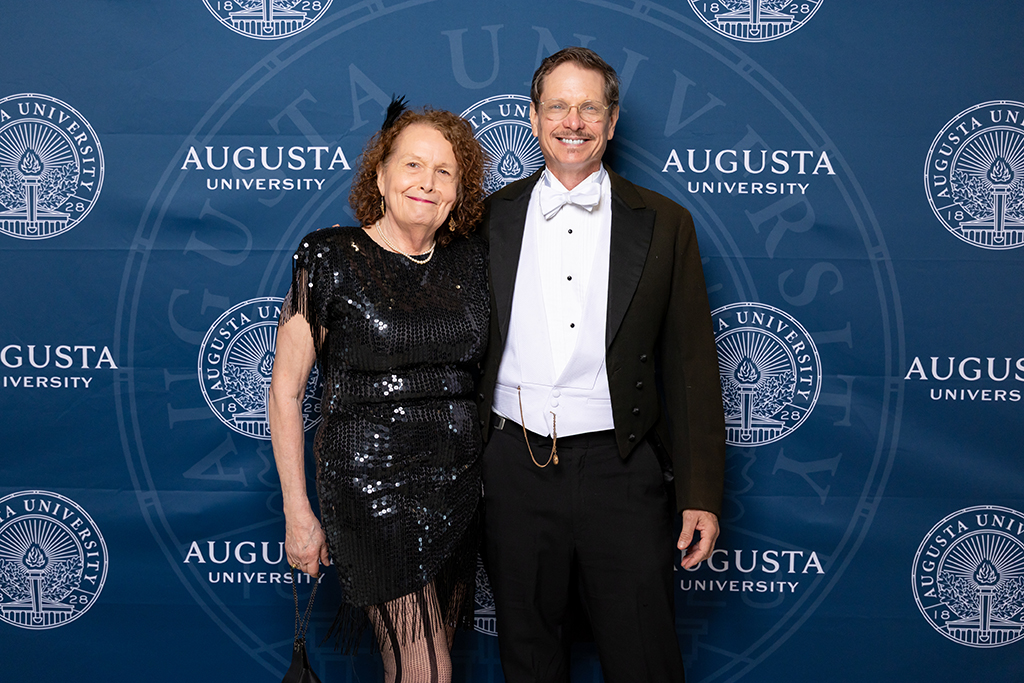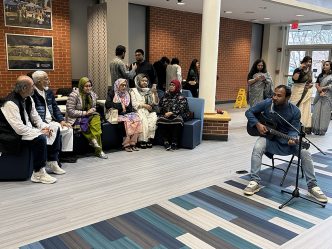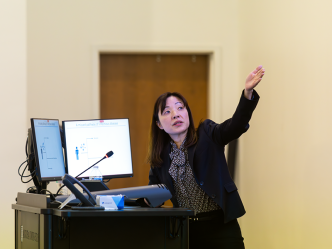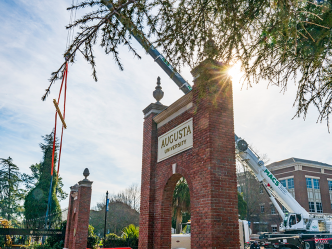Ray Whiting, PhD, was finishing the last of his degrees at Syracuse University when he began searching for full-time employment.
He said jobs in academia had stalled, and there were few to no openings. Then a big cohort of educators retired, and replacements were sought. As he scoured openings, he came across one at Augusta University’s legacy institution, Augusta College, that he felt was written specifically for him.

“The job description fit me perfectly,” Whiting said. “They wanted someone who could teach political philosophy, and that was part of the undergraduate major, and they wanted someone who could manage the paralegal program that we had at that time, and someone to teach political science. I had my PhD in social science. I have a law degree, and it was so tightly tailored for me that I had to apply for it. It was crazy not to.”
Whiting is retiring from AU after 35 years of faithfully teaching and serving in leadership roles. He has been recognized in the past with the Outstanding Faculty Member Award for Teaching Excellence, the Governor’s Teaching Fellow, the Louis K. Bell Research Award and the Richard S. Wallace Distinguished Service Award. He was also presented with an honorary membership to the National Society of Leadership and Success.
Throughout his life, he has been a lawyer, professor, mediator, author, special assistant and, most recently, an ordained minister. But in his opinion, his greatest achievement has been planting seeds with everyone he interacts with and watching them grow.
“He has legal training, ordained ministry training and is a political science professor. I believe this qualifies as a unicorn, and I never more needed someone like a unicorn like I needed him.”
Zack Kelehear, vice provost for Instruction and Innovation
The art of teaching
One of Whiting’s first responsibilities was teaching political science and American government. He loved teaching and preferred evening courses because he got a mix of older and younger students interacting together.
He said one of the most powerful things you can do as a teacher is storytelling. When you entered his classroom, you were going to get a lecture, but it was going to draw you in. Whiting said every constitutional law case is the perfect human interest story that has all the elements of a great novel.
“When you explain the case, you could explain just the cold elements of the law or you can bring them into all of the human elements of that case,” Whiting said. “I would use those to bring them in to understand that story and how the law shapes everything in our lives. In the United States, the Constitution is a sacred document, and everything revolves around it in our laws. I’m trying to give them that sense of what happens.”
Usually on the first day of class, he would dress down and sit with the students and wait. Time would pass, and everyone got anxious. He would ask what the students had heard about the professor, and everyone would start to talk.
“Then I would stand up and walk to the front of the classroom, and they would just be totally shocked and terrified about the fact that that had just happened,” Whiting said.
Craig Albert, PhD, who is the graduate director of the PhD in Intelligence, Defense, and Cybersecurity Policy and Master of Arts in Intelligence and Security Studies programs in the Katherine Reese Pamplin College of Arts, Humanities, and Social Sciences, has been a professor at Augusta University since 2009. He met Whiting as a freshman in 1997 in an American government class and remembers him being scary and intimidating, especially after their first interaction.
“He threw up a quote and asked us who we thought said it, and I thought it was John Locke. Nobody in the class got it right, but it was from Mao Tse-tung, and it sounded like he was promoting democracy,” Albert said. “I was super embarrassed that he called on me, and I got it wrong. He yelled at me a couple of times for saying ‘um’ in class, which is the big thing that Dr. Whiting did as a professor to correct your speech in class to make you ready for the professional world. But it’s something I still do to this day to my students because it works so well for me.”
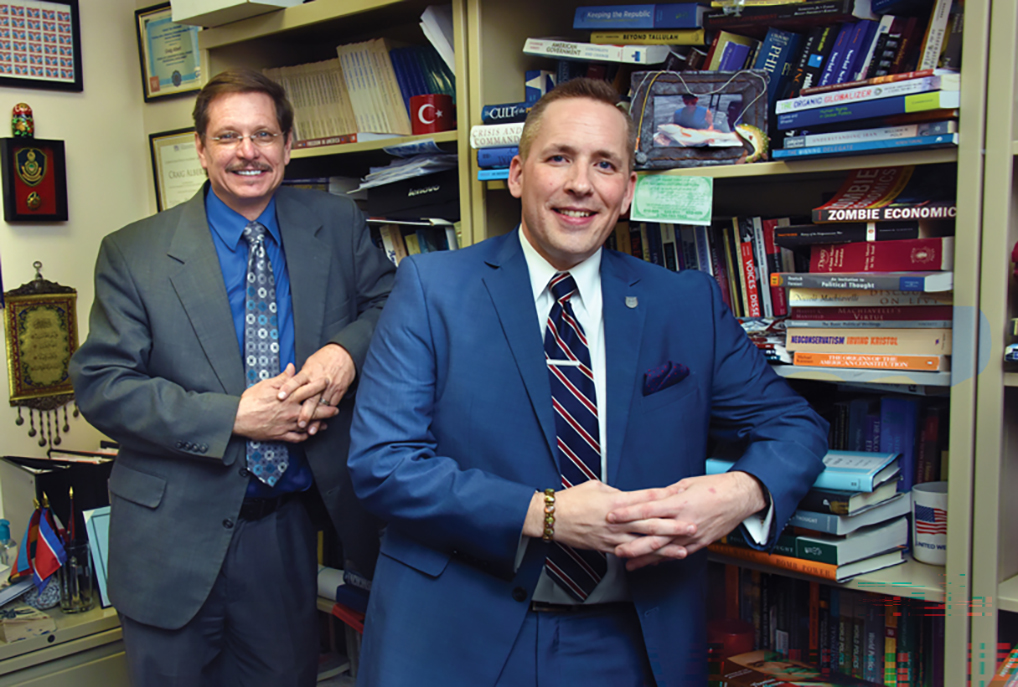
Albert had a swing of emotions after that initial interaction with Whiting. After first thinking the guy was a jerk, by the end of the class, Whiting had tied everything together, and it blew Albert’s mind.
“I changed my major literally that day because of him, and immediately he became my mentor and adviser,” Albert said.
Whiting answered all questions, no matter the topic, to encourage his students to interact. In his words, if he provided a lecture that drew his students’ interest and made it real, no matter what their chosen career path was, he was going to make the class interesting to show them how much it affected their lives.
An itch to do more
Whiting said he was getting restless for something new after several years of teaching. He wrote a book in his limited free time, but, after he was done with that project, he looked toward administration.
He applied for a position and was a finalist, but the other candidate – “the best choice,” in his words – was selected. But his interest piqued the school’s interest, and they assigned him a temporary position, special assistant to the vice president of academic affairs.
“That was just a part-time position, so I was still teaching,” Whiting explained. “The president decided that we needed someone to run our Southern Association of Colleges and Schools Commission on Colleges reaffirmation, so he made me the special assistant to the president. I stayed there for a while, and then consolidation came.”
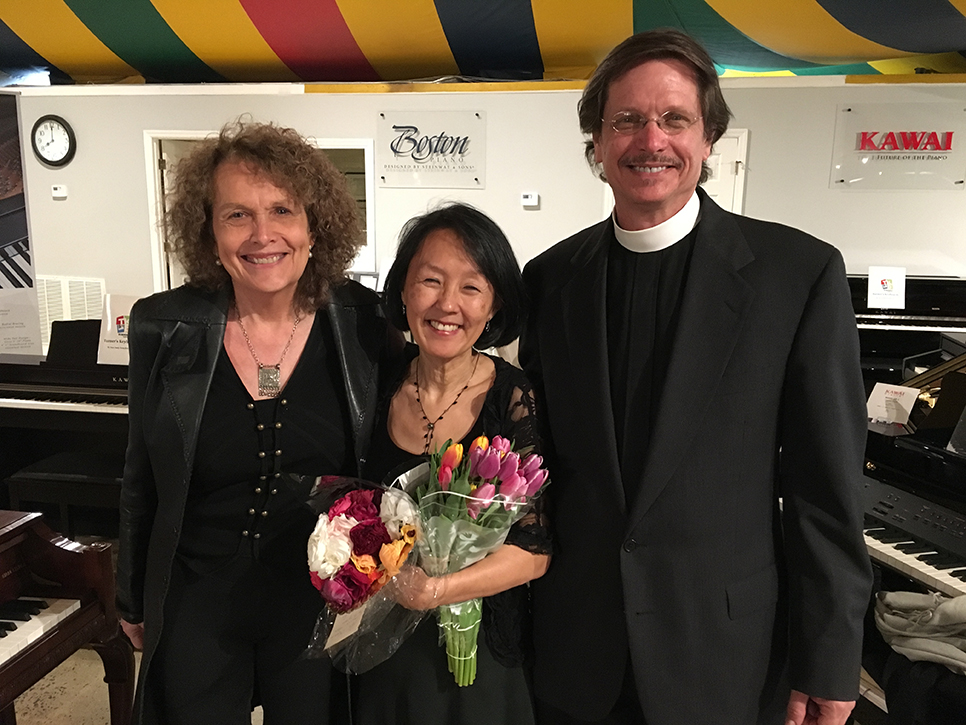
With consolidation, 12 representatives from the Health Science and Summerville campuses became the core committee. Whiting, who said those days were long since they all had day jobs, was later tasked with updating 150 policies. After many long hours, an agreement was in place between the two campuses, and the consolidation was finished.
The university relied on Whiting’s law background as he moved between positions. He was named associate vice president for Institutional Effectiveness and was there for a bit before joining Zach Kelehear, EdD, in the Office of Academic Affairs.
When Kelehear, the vice provost for Instruction and Innovation, came to AU 10 years ago, he heard of Whiting and learned of his background. When they began working together, Kelehear cherished the chance to work with him.
“He has legal training, ordained ministry training and is a political science professor. I believe this qualifies as a unicorn, and I never more needed someone like a unicorn like I needed him,” Kelehear said. “My book of work was varied, broad and sometimes not unified, and he offered me some anchoring that offered certainty in what sometimes seemed like uncertain times.”
Kelehear said Whiting had the ability to tell him things he didn’t want to hear, but he knew he needed to hear them.
“I always valued Ray because those were hard conversations, but they were never personal,” Kelehear said. “We needed to figure out how to best support the institutional mission. It’s hard to find someone who will be honest constantly in such a way. All of his training, those all came together in a lovely way to my benefit because he became a partner to me as I tried to explore ideas about what’s going on with instruction, innovation and what we should be doing.”
Kelehear said the only time he was disappointed was when they reassigned Whiting to the Office of Faculty Development so he could work closely with Karen Head, PhD.
“I became known for these different things that I did with people in leadership,” Whiting said. “This career of connections and understanding of how the university works, and, in my later years, a lot of it has been institutional memory. People will come to me and say, ‘OK, why is it like this?’ Or ‘Why did this happen?’ I would explain to them all the events that took place and why we ended up where we did. They knew how to alter ideas after those talks so we could move forward.”
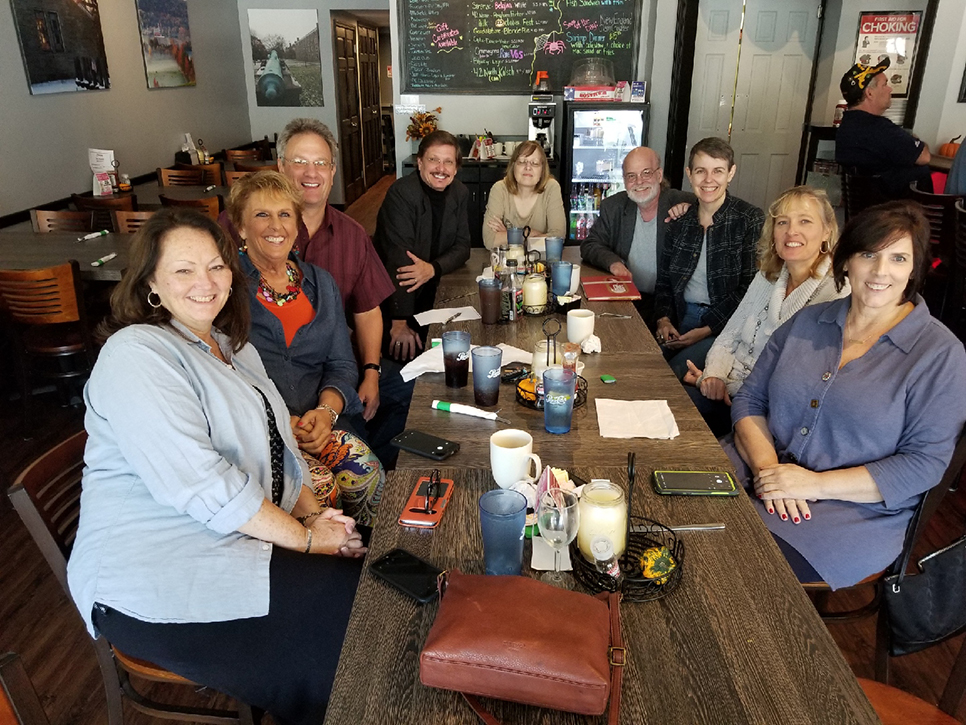
Leaving his mark
Mickey Williford, vice president for Institutional Effectiveness, met Whiting in 1995 when she took his political science class and found him to be a very effective teacher.
She was required to take a class as part of her undergraduate studies but disliked multiple-choice tests. After talking with an adviser, she discovered Whiting only had essay exams.
“I think he really did make me look at government in a different way,” Williford said. “I came away from that class having a better understanding of government, but also, more importantly, a better grasp on how to argue, how to not argue but make a point.
“There is diplomacy in how he responded to folks,” she continued. “Sometimes people would ask things that were not necessarily worded properly, but he could respond in a constructive way. That’s where he had the greatest impact on me.”
“The legacy is planting seeds. You don’t always get to see those seeds grow to flourishing, so you continue to try to plant those seeds, no matter what position you’re in or where you are, and hope that they actually grow into the beautiful things that they’re supposed to grow into.”
Ray Whiting, PhD
Williford later encountered Whiting during her capstone project in the Master of Public Administration program, and, when she started working at AU, their paths would cross in professional meetings. They worked closely during the consolidation process as they were two of the people who knew the most about accreditation.
“Then over time, he actually came to work in IE as part of our greater team in the consolidated university. We’ve been colleagues probably for most of the time I’ve known him. He’s taking a lot of knowledge and history with him when he retires,” she said. “Something he brought to the table even before the consolidation was his ability to carry that sort of parliamentary role that he’s brought into everything he does. He’s been somebody whom faculty will go to for advice and guidance.”
Albert said Whiting was the father figure he lacked growing up. They would go to dinner, and Whiting would teach him how to sit, eat and speak properly in front of people.
They interacted every day when Albert worked in the political science office as a student assistant, and he took multiple classes during his undergraduate program.
“He helped me decide that I didn’t want to go to law school and then helped me decide what I did want to do, which was pursue my PhD in political science,” Albert said. “He helped me through the application process, wrote letters for me, guided me through my misery when I got rejected and helped me celebrate when I got accepted into graduate school.
“He would yell at me for mistakes I made morally, behaviorally, academically, professionally and celebrated my achievements all through grad school. He was still my mentor and adviser, and when I earned my master’s, he was the first person I called on a very snowy day at the University of Connecticut,” an emotional Albert said, fighting back tears.
Whiting established the A.L. Williams, Jr. Scholarship Endowment and the Janice and Ray Whiting Scholarship Endowment with his wife, retired art professor Janice Williams Whiting, because they believe in the institution. They have been lifelong educators and AU supporters, and those scholarships are part of their legacy.
“The legacy is planting seeds,” Whiting said. “You don’t always get to see those seeds grow to flourishing, so you continue to try to plant those seeds, no matter what position you’re in or where you are, and hope that they actually grow into the beautiful things that they’re supposed to grow into.”
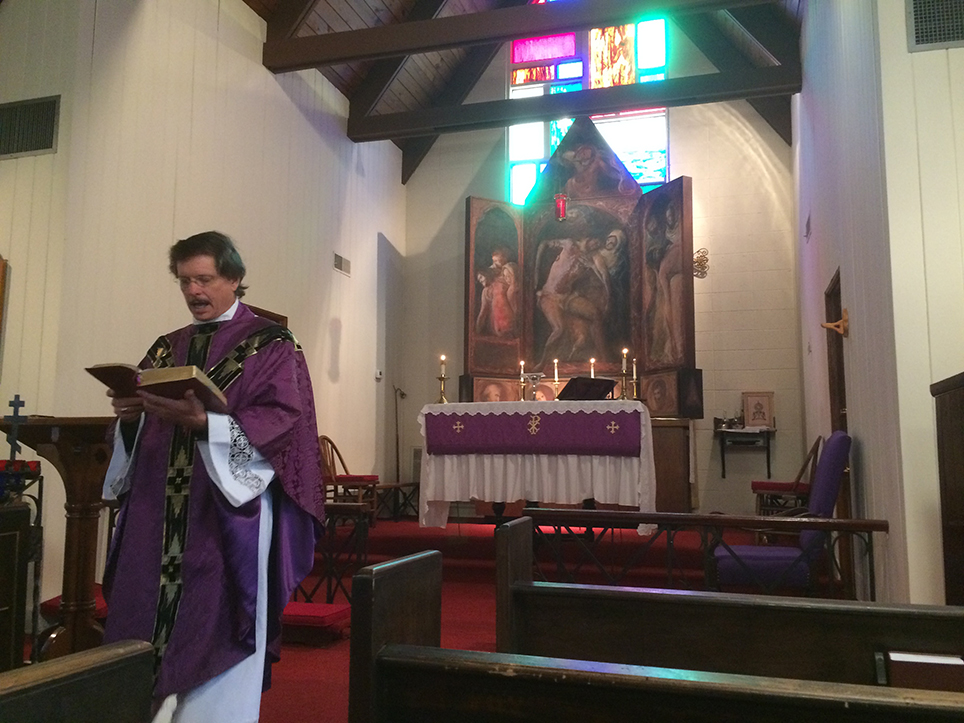
 Augusta University
Augusta University
